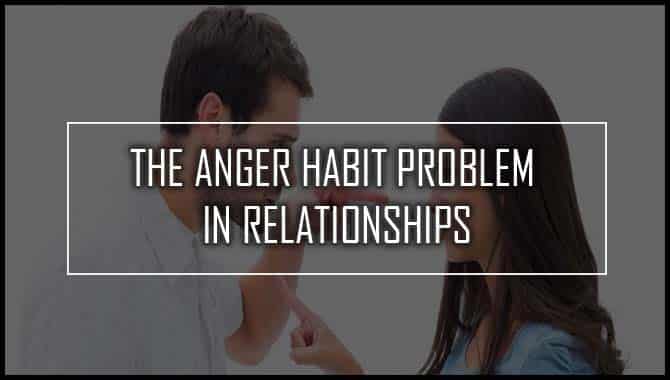The anger habit problem is a term used to describe the plight of couples in which one partner habitually resorts to anger to manage relationship issues. Anger is often viewed as an effective tool to get what you want, but in the wrong hands, it can be destructive.
If you struggle with anger management issues in your relationships, read on for some helpful insights into the problem and the possible solutions. Pay special attention to the signs of anger problems and how you can start breaking the cycle of the anger habit problem in relationships.

Anger Issue In Relationship

Anger is a natural emotion that can help us protect ourselves when we’re in danger or feeling attacked. However, when anger becomes a chronic habit, it can become a problem.
When we get angry often, our amygdala (the part of the brain responsible for emotions) starts to get over-activated. This means that our reactions to events are unpredictable and can be destructive. We may lash out at people who don’t deserve it or lash out at ourselves even more.
In terms of relationships, this can have devastating consequences. When we’re angry all the time, it’s hard to form or maintain relationships because we’re incapable of being calm and rational.
We also become hostile and difficult to get along with – which only worsens things for the people around us and us. Signs And Solutions To The Anger Habit Problem In Relationships
Anger is a normal response to certain situations. However, if anger becomes habitual, it can have negative consequences in relationships. There are several signs that you may be experiencing the anger habit problem in relationships, and it’s important to consult with a therapist or counselor to get help resolving the issue.
If you cannot figure out why you’re angry all of the time, soul-searching may be in order. In addition, developing healthy coping mechanisms can help you avoid lashing out in response to anger or frustration. Do your best to stay connected to your partner during tough times, and remember that communication is the key to resolving any conflict.
8 Signs Of Anger Problems
Anger problems in relationships can be tough to deal with. It can feel like the anger habit is taking over, and you can’t seem to shake it. People with an anger habit often find it difficult to control their temper. This means that they become easily angered and react harshly to minor irritations.
This can have serious consequences for their relationships because it makes it difficult for them to communicate effectively. It also makes it hard for them to compromise or resolve disputes peacefully. If you’re struggling with any of the following signs, it might be time to seek help.
Lacking Awareness Of One’s Emotions
People who lack awareness of their emotions tend to struggle to control anger. This is because they are quick to act on any impulses, no matter how small the situation may seem. They also find it difficult to understand why things bother them and get frustrated easily.
As a result, they lash out aggressively when angry – leading to further conflict or even hurt feelings on the part of those around them. In addition, people with poor emotional awareness often experience tension and stress more frequently than others. This leads to problems such as anxiety or depression, which can significantly impair one’s quality of life.
Lack Of Assertive Communication
Assertive communication is a skill that can help in resolving conflicts and enhancing relationships. When practiced correctly, it enables both individuals to have their voices heard and resolve misunderstandings without the need for violence or verbal attacks.
Generally speaking, you likely suffer from some of the following symptoms when it comes to assertive communication: difficulty voicing your concerns or objections; lashing out at the slightest provocation; keeping your temper in check; not being able to solve disagreements through dialogue alone.
If you want to improve your relationships – whether with friends, family members, or romantic partners – learning how to use assertive communication will go a long way. It might take some time and effort upfront, but the benefits are worth it.
Use Of Unconstructive Self-Talk.

Unconstructive self-talk refers to negative and destructive thoughts we habitually entertain about ourselves. Many people struggle with anger issues. Anger is a normal stress response, but when it’s uncontrolled or lasts too long, it can lead to destructive behavior.
One of the most common forms of unconstructive self-talk people use is blaming others. This happens when you start thinking negatively about other people and assign them all the responsibility for your problems. You then believe they are responsible for making you angry and unhappy, which only worsens things.
Other forms of unconstructive self-talk include beating yourself up for feeling angry and thinking bad thoughts about yourself. This thinking only worsens things because it destroys your sense of self-worth and motivation. All these negative thoughts also distract you from addressing the actual problem.
Belittling A Partner With Minimizing Behaviors.

Four main types of behavior can lead to belittling a partner. The first one is to criticize everything your partner does without giving them constructive criticism. Yelling, screaming, and being verbally abusive are the next three. Ignoring their feelings and needs altogether is the last type of behavior.
This article will focus on criticizing everything your partner does, as this is the most common behavior behind belittling partners. It’s important to offer constructive criticism that doesn’t put them down or make them feel defensive about their actions or ideas.
Simply pointing out flaws isn’t enough – it’s also necessary to explain why those flaws exist and how they could be improved upon next time around. Doing so will help build trust between you and your partner, which is essential for healthy communication.
Avoiding Certain Situations To Prevent Your Partner’s Anger.
Various situations can lead to anger in a relationship. One of the most common is when one partner argues too much, destroys property, ornaments, or clothes without reason, puts their partner down in public, or isolates themselves from them. Both partners will benefit greatly by avoiding these situations and preventing anger from happening in the first place.
You Give In To Avoid Outbursts, Not Out Of Love

If you tolerate anger in your relationship, it’s time to stop. It is not healthy to put up with anger – no matter how long you have been doing so. In the long run, this will result in major problems.
For one thing, you may start accepting unacceptable behavior as the norm. This eventually makes it even harder to deal with disagreements or problems between you and your partner.
You might also lose control over your emotions and explode without thinking about the consequences of such an outburst. Worst of all, this toxic behavior can also carry on into future relationships.
Difficulty Enjoying Activities Or Carrying Out Tasks.
People who struggle to enjoy activities or tasks often struggle to express their emotions. They may also be reluctant to disagree, as any disagreement can easily turn into anger. Being overly critical of themselves and others is another common trait of people with difficulty enjoying activities or tasks.
These individuals usually have a lot of anger bottled up inside them and find reasons to lash out in destructive ways – most commonly by yelling, attacking partners, etcetera. In the long run, this leads to problems such as relationship breakdowns and mental health issues.
Aggression Occurs In Multiple Forms.
There is a lot of aggression, and unfortunately, it can take many forms. People who suffer from anger problems often display aggressive behavior in multiple ways. This might include verbal attacks, physical violence, or even sabotage in relationships. Suppose you’re noticing any of the following signs. In that case, it’s important to seek help:
- Feeling irritable for no reason, tense or angry all the time.
- Losing your temper easily.
- Being quick to judge others.
If you find these problems affecting your daily life and impacting your ability to function normally, consulting a therapist or counselor would be a good idea. They will be able to help identify and solve the root cause of the issue so that things improve gradually over time instead of suddenly changing for the worse.
The Solution To Manage Anger Issues In Relationships
Anger is a normal response to certain situations, but uncontrolled and chronic can lead to problems in a relationship. If you find that anger is becoming a problem in your relationship, it’s time to take action.
There are many different techniques for managing anger, so find one that works best for you and your partner. Once you have a plan, stick to it until the anger habit problem goes away.
Avoid The Impulse To Cut Off
Anger is normal, but it can quickly become an anger problem if not managed properly. In order to prevent this from happening, try to identify the source of your anger.
This will help you better understand why you’re getting angry and allow for more effective communication. Once you know where the anger comes from, work towards resolving the issue head-on instead of cutting off communication altogether.
Focus On Managing Yourself
Anger is a normal and natural human emotion, but when it starts to get out of hand, it can have serious consequences in your relationships. When anger begins to take hold, it can lead to unpleasant thoughts, feelings, and behaviors.
It can also cause us to lash out at others in an attempt to resolve our feelings, which often results in further conflict. In the long run, this can lead to problems like damaged relationships and trouble at work. If you find yourself getting angry more often than not, it’s time to take action. There are a few things you can do to manage your anger and deal with the situation calmly and effectively:
1) Recognize that anger is a normal response to certain situations – don’t feel bad or guilty for feeling anger.
2) Don’t bottle up your anger – talk about what’s bothering you so that the problem can be solved. Talking openly helps reduce the amount of emotional energy stored inside (and eventually released).
3) Set clear boundaries with people who make you angry – communicating clearly about how far they’re allowed to go will help maintain healthy relationship dynamics.
4) Take care of yourself emotionally– by focusing on self-care activities like exercise or mindfulness meditation, you’ll be able to provide emotional stability when things get tough.
Be Aware Of Triangles
Anger is a normal response to feeling frustrated or threatened, but when anger occurs in triangles, it can get out of hand very quickly. When one person always takes the lead, and the other gets stuck in the middle, anger issues tend to escalate rapidly.
This often leads to power struggles where one person feels unheard and powerless. The best way to deal with anger in these situations is by learning how to manage it better. Doing this will allow you not only to control your emotions but also to communicate more effectively with your partner.
However, don’t wait until things spiral out of control – start managing your anger now so that future conflicts are avoided altogether.
Look Past The Issues
There are times when anger feels like the only logical response. However, it’s important to remember that it’s not easy to control this emotion, and it often has a negative impact on our lives.
In order to deal with anger effectively, we need to understand its different forms and where it comes from. Once we know this, we can begin the process of working through our anger in a healthy way by identifying the triggers and addressing them head-on.
There are many ways of dealing with anger – prayer is one of the oldest methods; meditation helps us focus on our thoughts, and exercising releases energy in positive ways.
It is also important to find an outlet for our emotions, such as talking about them or writing down what happened so that they don’t fester inside us any longer. Lastly, communication is key: We need to be honest with each other without resorting to violence or insults.
When Does Anger Become Abuse?
Anger is a natural emotion, but when it becomes an anger habit, it can become a problem in relationships. The signs of an anger habit include becoming agitated easily and resorting to verbal attacks or physical violence. If you’re noticing any of these behaviors in your relationship, it’s time to seek help. No one deserves to be treated this way, so reach out for help immediately.
The Anger Cycle In Relationships
When anger turns into abuse, it is a vicious cycle that starts with verbal attacks. The abuser then becomes controlling and makes you do everything their way. Next is the emotional blackmail phase where they make you feel guilty for your anger.
Lastly, the physical violence phase takes place when the abuser gets violent toward you. If this isn’t enough to scare you off from anger altogether, know that this abusive cycle can last for many years until one of these stages breaks down and leads to healthier relationships again.
Breaking The Anger Cycle In Relationships

Anger is one of the most frustrating emotions, and it can wreak havoc in relationships. If you find yourself struggling with anger in your relationships, it may be because you’re engaging in the same unhealthy behavior over and over again.
The key to breaking the anger cycle is to learn to identify and address your triggers quickly. This may involve talking to your partner about why they’re behaving the way they are, but make sure that you don’t get angry yourself.
Next, set boundaries – telling your partner that their actions are unacceptable without getting angry yourself. And finally, once you’ve learned how to stop the anger cycle, it will be much easier to maintain healthy relationships.
Conclusion
Anger issues in relationships can be tough to deal with, but there are ways to overcome them. Some of the most common sources of anger in people include feeling powerless, being ignored or ridiculed, and feeling like others are unfair or unjust.
If these situations happen frequently enough, they can lead to an anger habit – which is when you get angry without any real reason.
By following the tips and signs outlined in this blog, you can start to break the anger habit in your relationships and start living a happier life. If you’re struggling with anger problems in your relationship, don’t hesitate to reach out for help. We’re here to support you.
Frequently Asked Questions
What Is The Best Way To Stop An Anger Habit?
There’s no one-size-fits-all answer to this question, as the best way to stop an anger habit will vary depending on the individual. However, here are a few tips that may help:
- Be honest with yourself.
- Set realistic goals.
- Stay positive and persistent.
- Talk about it with someone else.
How Do Anger Issues Affect A Relationship?
When anger issues arise in a relationship, it can have a negative effect on the entire relationship. Anger communication can lead to relationship conflict, hurt feelings, and even breakups.
To keep your relationship healthy and happy, it is important to be able to identify when you get angry and try to avoid speaking negatively about your partner without having a good reason. When done in a constructive manner, honest communication can help to prevent anger from ruining your relationships.
What Causes Anger In A Relationship?
There are many reasons why anger may arise in a relationship. One of the most common is when one person feels unheard or unimportant. When this happens, the individual begins to build up anger as their only way of dealing with harsh emotions.
Furthermore, anger can stem from hurt feelings, unresolved disputes, and feeling overwhelmed by life. When these things are left unresolved for too long, anger can become a habit that gets bottled up and taken out on the people we love the most.
Is Anger Normal In A Relationship?
Yes, anger is normal in a relationship, and it can be a sign of strong feelings. However, when anger becomes a habit, it can become a problem in the relationship. An angry relationship is characterized by constant conflict and argumentation.
The most common cause of anger problems in relationships is unresolved issues from the past. In order to keep your relationship healthy and anger-free, it’s important to address these issues head-on.
How Do You Overcome Anger In A Relationship?
When anger in a relationship becomes a problem, the best thing to do is, to be honest with each other and work on addressing the anger together. This can help you both understand the anger better and find solutions that work for both of you. If anger is becoming a problem, you may need to seek professional help.
However, make sure you take the time for yourself first and foremost so that you don’t get caught up in anger and resentment. Fighting doesn’t solve anything, but it can cause further damage over time if left unchecked.

Leave a Reply